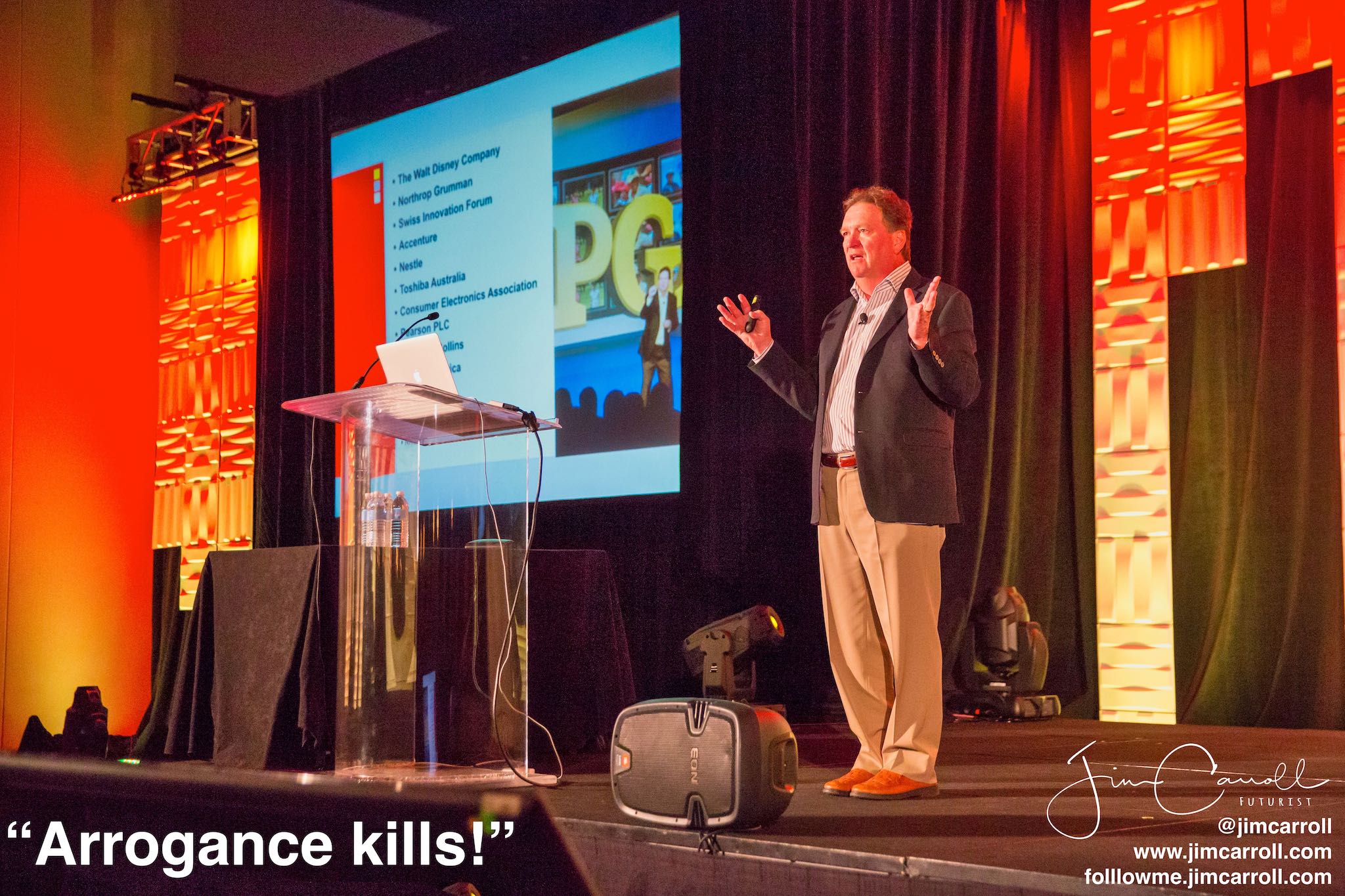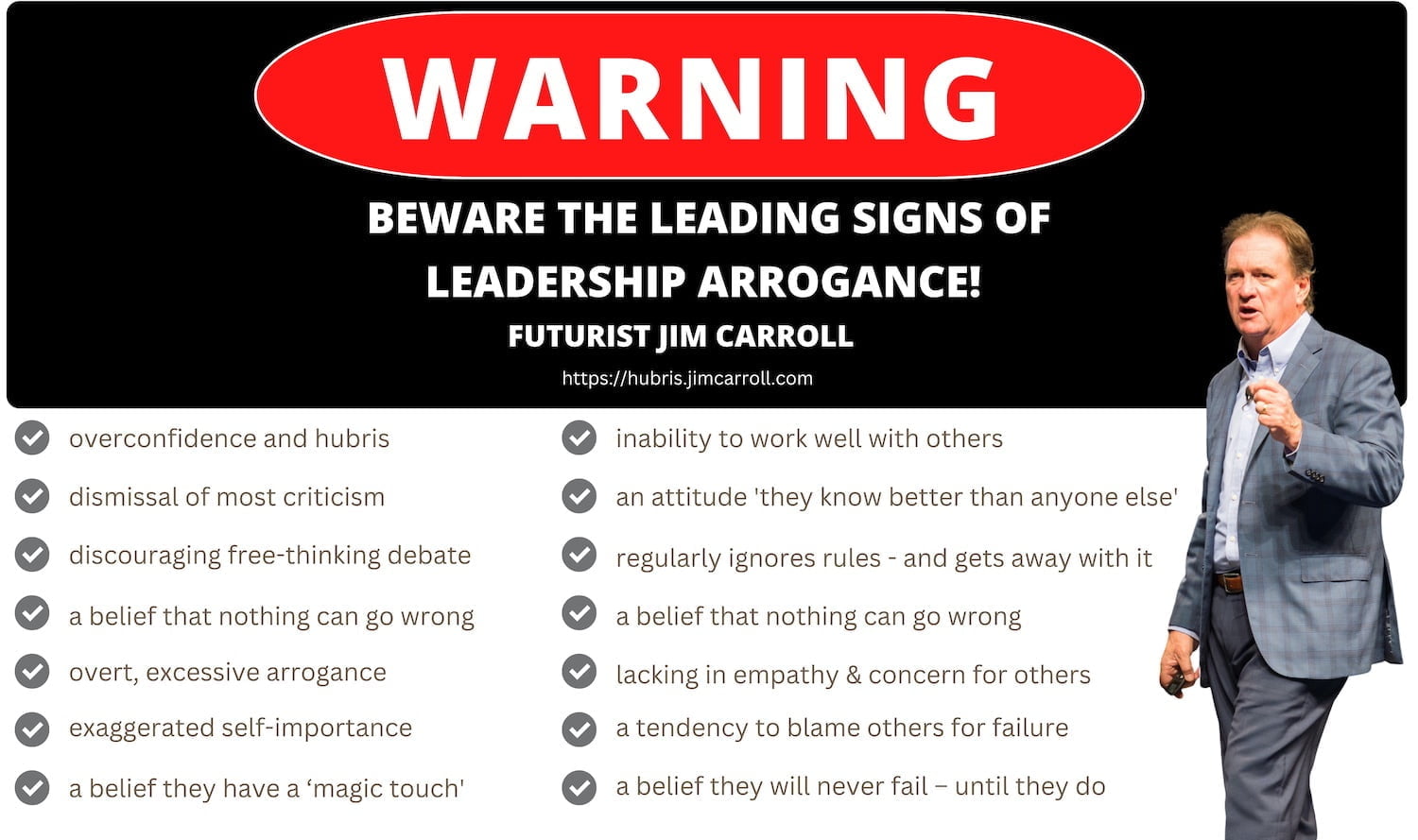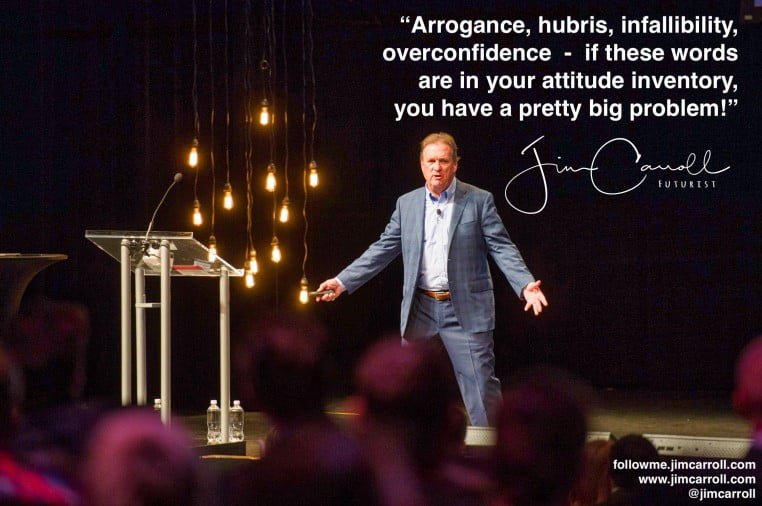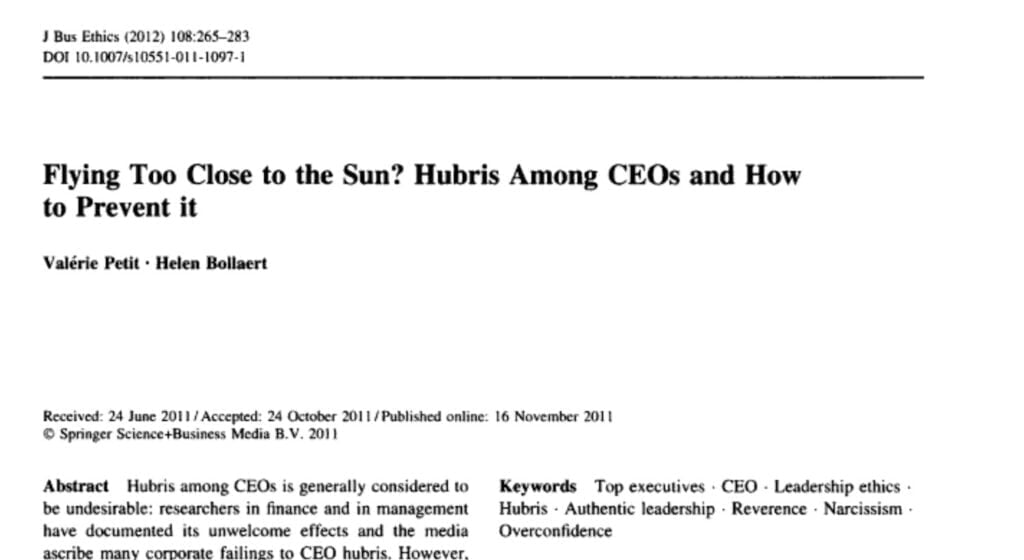Let’s talk about hubris and arrogance.
It kills.

And it happens, a lot.
And now, it happens faster. You can watch CEO arrogance happen live, in real-time – you are probably doing that right now. Think about it – in the olden days, like, 10-20 years ago, it took years, if not decades, to watch organizations like Sears, Kodak, Blockbuster, and Nokia implode. Now, with Twitter, Facebook, and other tech firms, you can watch it happen before your very eyes – at blinding speed!
It’s the Icarus show!
In organisations, the Icarus syndrome characterises leaders who initiate overly ambitious projects that come to naught, causing harm to themselves and others in the process. Fuelled by excitement, these leaders are unable to rein in their misguided enthusiasm before it is too late. Often, these leaders have let adulation go to their heads. They display symptoms such as:
- Placing excessive confidence in their own judgment
- Harbouring feelings of omnipotence
- Becoming reckless and restless
- Displaying contempt for the advice and criticism of others
- Ignoring the practicality, cost or damaging consequences of their various endeavours.
Insead Knowledge, 01 Jul 2019
Arrogance? Hubris? This is what happens.

I’ve seen this current movie with Elon Musk before. I’ve been in the tech and innovation world since 1982. I’ve seen it all. I’ve lived oh, so close to it. Some of my clients have imploded, ignoring the advice that I and others have given them. I’ve spent a ton of time on stage talking about this.

And it hits close to home. Google Maps tells me that my home office, where I am writing this post, is exactly 23.49 km (or 14.60 miles) from the Headquarters of Research in Motion in Waterloo, Ontario, Canada. Remember them? The maker of the ubiquitous Blackberry of the early 2000s. It was the leading communications device, owning the world – until the firm spectacularly imploded and failed because of the hubris and arrogance of the two founders, Mike Lazaridis and Jim Balsillie. I knew the latter – having spoken at a few Young Presidents Association dinners for the Kitchener Waterloo region, of which he was an eager participant, as well as having done various talks for various groups within the organization over the years. (I can relay that he did use his Blackberry while standing at a urinal. Odd.)
“Hubris is a tendency of leaders to hold an overly confident view of their own capabilities and to abuse power for their own selfish goals, sometimes with disastrous consequences for organizations.”
How To Prevent Leadership Hubris?, University of Zurich
I also know that Jim was blind to the future of the company in the face of a staggering onslaught of disruptive innovation from Steve Jobs and Apple, who eventually crushed the organization into almost nothingness. (Today, it’s still around, a bit of a player in-car technology and some other stuff.)
Why does hubris happen? How can we best understand it to understand the awfulness of our world at this moment? I recently used my online research service, Dow Jones Factiva, to dig into news articles and research papers about CEO arrogance and hubris going back 30 years – a few hundred articles. I’ve been plowing through them day after day, and have sat on this post for several months. Not only that, but I also hit a ton of research papers. Thie thing is – CEO arrogance and hubris is not new thing. It’s been studied for decades since it has driven so many high-profile failures over the years. The world of academia has covered it in a great deal of death over the years in research papers like this:

And everything I read in the 120 pages of articles and research papers I pulled down is neatly summarized into these characteristics. This is what happens to CEOs who fall into the trap of destructive ego.
- overconfidence – they can do no wrong
- belief in the praise that surrounds them
- dismissal of criticism
- discouragement of free-thinking debate
- lack of pushback by self-assembled sycophants
- reality impacted by excessive laudatory PR
- a belief that nothing can go wrong
- exaggerated self-importance
- a belief that they have a unique ‘magic touch
- overt, excessive arrogance
- inability to work well with others
- a belief that they are truly accurate in predicting the future
- lacking in empathy, demonstrated by not caring for others
- excessive pride is driven by previous success
- countless histories of not following the rules and getting away with it
- overconfidence in their judgment
- a belief that they know better than anyone else
- a belief that they will *do better* than anyone else
- suffer from ‘risk perception bias’ – a belief that they can easily modify and lower risk and thereby act accordingly
- a tendency to blame others for failure – it’s ‘not their fault’
- a belief they will never fail – until they do
It’s a pretty stunning list. Ask yourself – does this sound like anyone you know today?
Here’s an interesting twist. Back in 2007, folks were already talking about the fact that PR was accelerating hubris and arrogance.
Too often, corporate executives are surrounded by praise just because they are the boss. The worst CEOs simply start to believe their own press releases and dismiss any information to the contrary.
A straight-up cure for CEO hubris, 19 January 2007, The Denver Post
Today, in the era of social media, the celebrity CEO is fed the addictive drug of constant PR at the speed of an intravenous drip of speed-gush. Twitter itself becomes the engine of failure.
When hubris settles in, the results are deadly. The CEO fails to see that customers are changing, the R&D is stagnating, the product line is wildly out of date, that product quality is suffering, new competitors are moving faster than they are, and costs are ballooning while revenue is declining. They are blind to reality, living with their own self-engineered thought bubble of grandiose ideas and past success. Ultimately, they fail. It usually never plays out well. I’ve covered this on stage many times. As in, don’t be Motorola!
The sad thing is that arrogant leaders destroy others on their way down. The lack of empathy drives the knife edge of cruelty into human lives.
If leaders afflicted by the Icarus syndrome only sowed the seeds of their own downfall, it would be tragic enough. But they often put their entire organisation at risk. Leaders who make all their decisions without ever consulting others invariably make grave mistakes, generating corporate collateral damage.
Insead Knowledge, 01 Jul 2019
Here’s the thing – the arrogant CEO, once unleashed, is often impossible to contain. The destruction can be widespread. Employees are the first to be hammered, bruised, and beaten.
As the subordinates of such leaders realize that any disagreements with the boss only trigger contempt, the culture becomes one where bad news is taboo. Furthermore, hubristic leaders tend to disregard company values and policies, thinking these don’t apply to them. The constant overstepping of boundaries demoralises and disempowers their teams, which may contribute to psychological disengagement, making it more likely that the best employees will leave.
Insead Knowledge, 01 Jul 2019
Oh, and this – they end up straying from their core mission, believing they can do anything. And so while RIM was imploding and Blackberry technology was stagnating and failing, Jim Balsillie was trying to buy an NHL team. He failed. Many arrogant CEOs stray from their core focus – you might be able to build spaceships and cars that change the world, but fixing a fractious world is far more complicated.
It never ends well.
The Icarus syndrome, with its signature lack of humility, is a pattern that every leader needs to be concerned about. It has felled many leaders who planned grandly but failed miserably by overestimating their knowledge, foresight, and ability.
Insead Knowledge, 01 Jul 2019
Failure is the usual end result unless someone can break through.
When leaders have floated too long in a gilded bubble, untethered from reality, it becomes difficult for them to see their own affliction. The reality is that it takes very little to erode a leader’s position of strength. There is a truism in the credo that only the paranoid survive. Leaders would do well to take nothing for granted and to do whatever it takes to avoid the fate of Icarus.
Insead Knowledge, 01 Jul 2019
I find it so sad, and I’ve seen it so many times.
Over the years, we’ve seen many success stories within my global Fortune 500 client list, but I’ve also seen many failures. For example, I spent time with Nortel, DaimlerChrysler, Research In Motion/Blackberry, and others over 15 years ago. Each involves a story of hubris and failure.
A good example: during a strategy meeting with a top leadership team at DaimlerChrysler in 2004, I suggested that they might want to keep an eye on the concept of a “GoogleCar” – a scenario in which Google might decide to become a car company. Essentially, I gave them a scenario in which a hi-tech company could become a new competitor, redefining the dynamics of the industry – a shift of the automotive industry in which Silicon Valley would define the speed of change. In that way, I predicted the emergence of Tesla, which today is pretty much setting the pace in the self-driving, EV category.
What did they do? How did they react?I think some of them thought I was an idiot, based on some of the feedback. Oops! Today? I’ve been proven right, and I know those folks are long gone from the organization. The merger of Chrysler and Mercedes? It failed. The legacy car company? Tesla owns the future of the industry.
Motorola? I suggested they not concentrate on the success of the Razr phone, but instead worry about the potential for disruptors such as Apple to redefine their industry. Oops! iPhone!
Research in Motion? I emphasized many times that maybe one day, people might use phones without physical keyboards and would do more than messaging. Oops! iPhone!
History is littered with the wreckage of organizations that did not step up to the plate of the speed of future trends, and who have failed to adapt to fast-paced market change.
What happens to organizations like these? Why do things go wrong?
There’s a long list of reasons for failure – and CEO arrogance and hubris will compound these base problems.
- a belief in their ‘incumbency’ – they’ve been successful for so long they do not fear any threat!
- the invincibility syndrome – nothing will ever come along that might challenge their success!
- a culture that does not promote shared goals, and in which each and every division is in it for themselves – promoting massive dysfunction and missed collective opportunity
- a failure to realize and adapt to the pace of change – simply put, they are structured for slow in the era of fast!
- an inability to recognize their competitors are moving faster than they are – they don’t like to acknowledge their competitor’s success
- and an inability to confront the truth of what they see out in the world around them – denial runs rampant! – an inadequate trends radar: they simply miss the signs of what is coming next!
The list goes on.
We live in a wonderful world that is filled with constant sadness. So it is today.
While I was finishing off this post – which I sat on for months – I came across this Twitter thread from Chris Sacca – @sacca. I hope he doesn’t mind me sharing it in its entirey here. It has direct relevance to everything I just wrote here.
https://twitter.com/sacca/status/1589732881232203776
Chris Sacca ????????
208 views
One of the biggest risks of wealth/power is no longer having anyone around you who can push back, give candid feedback, suggest alternatives, or just simply let you know you’re wrong.
A shrinking worldview combined with intellectual isolation leads to out-of-touch shit. ????
Am I commenting on current events? Yes.
Is this also autobiographical? Yes.
It takes extra effort to surround yourself with people who feel empowered to say ‘no’ when they’re generally incentivized to just say ‘yes’ and hope it ingratiates them or gets them something.
I’ve known Elon a long time. I’ve admired his thinking & ambition. His ability to note and question the assumptions implicit in the rest of our thinking is a rare type of genius I’ve only seen in the greatest minds. His success to date is not an accident. Tesla is world positive.
I’ve had fun nights out with him (did you know he is a skilled close-up magician?), and I’ve learned a lot from him. He’s given me solid advice multiple times, and he has personally accelerated my and Lowercarbon’s ambitions to unfuck the planet.
But I’ve recently watched those around him become increasingly sycophantic and opportunistic. Simply put, agreeing with him is easier, and there is more financial & social upside. Personally, I would love to sell Tesla the battery lithium they need, so even I have bit my tongue.
I’m a founding member of the Twitter Can Be So Much Better Party, and strong leadership from first principles could deliver results that wouldn’t ever make it through a committee. But many of Twitter’s core issues just can’t be reduced to black and white.
They are gray AF.
Batteries and motors and rockets and tunnels and solar panels have definitively right and wrong answers. Success criteria can be objectively measured. Elon’s mind is maybe the greatest in history for pushing those ideas and their execution forward.
But this shit ain’t that.
Policy requires sharp people, w/ diverse lenses on the world, pushing back and forth, challenging each other. You want balanced speech and truth? That’s how it’s forged. Frankly, I wouldn’t nominate myself for that room as I’m too biased against fake Christian patriot shitheads.
But Twitter isn’t going to get better for users, the advertisers aren’t coming back at scale, and his huge investment just isn’t going to pay off unless there is genuine dialogue leading to thoughtful progress and stability.
“Move fast and break things” – Never been a fan, but at least that guy keeps some smart people around and sometimes listens. I hate most of their decisions, but they are free to suggest to Zuck that he’s full of shit.
But, “Move fast and alone,” and it’s all guaranteed to break.
That’s the thing though. This guy is alone. He has plenty of “pals” and is the life of parties and dinners. But the hard truth is that he is straight-up alone right now and winging this. If you’re trying to make sense of anything, that context might help.
That’s what got Travis in the end too. Travis is objectively brilliant, and a good debater. But as he became powerful only the suck-ups remained. He had no real friends left. Travis had a board seat to fill, and there was almost no one he could put in it because he was alone.
No one on Earth is good enough to get it all done on their own. It’s easy to think we are, especially when shit goes right. The path of least resistance is to attribute success to our talent/skills/etc. But, if we’re lucky enough to be honest with ourselves, we see it’s not true.
To those questioning if I’m going to Mastodon:
That’s like asking if I’m going to quit a pack-a-day Camels habit to start rolling my own clove cigarettes.
Like the rest of you, I just need to stop smoking.
But until I can kick this addiction, I am rooting for Twitter. Every day it’s looking more like an uphill battle. So much product and policy talent was pushed out the company door, and, my god, you just can’t fire that many engs, ops, and SREs and expect the site to stay healthy.
Yet, I really want this thing to work. The only way I see that happening is if anyone around Elon can speak some truth to power and complement his bold and ambitious instincts with desperately needed nuance. Humans aren’t math and physics problems.
We are fucking messy.
I’m turning comments off b/c I’m a snowflake who’s about to piss off everyone. The crypto-incel disciples will yell at me for not licking boots & the haters will read this as me blindly rooting for every move he makes. No doubt Elon himself will be taking me off his nice list.
Been on Twitter long enough to know that I probably should’ve kept this thread in drafts.
But I can’t sit by and watch a guy I’ve looked up to for over a decade fumble this opportunity, stoke more insanity, and likely hurt a bunch of folks in the process.
Either way, we need all hands on deck. So, go here and find your next thing, make a bunch of money, and feel proud:
• • •




GET IN TOUCH
Jim's Facebook page
You'll find Jim's latest videos on Youtube
Mastodon. What's on Jim's mind? Check his feed!
LinkedIn - reach out to Jim for a professional connection!
Flickr! Get inspired! A massive archive of all of Jim's daily inspirational quotes!
Instagram - the home for Jim's motivational mind!